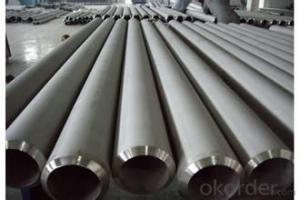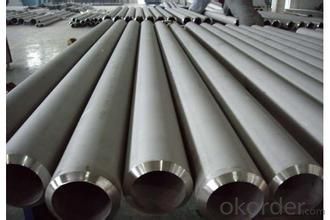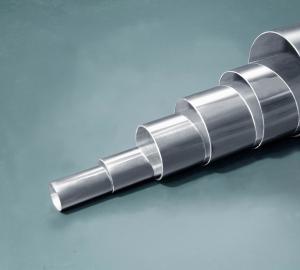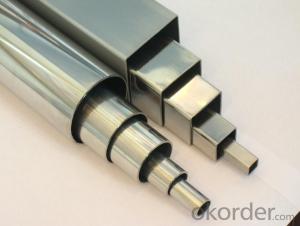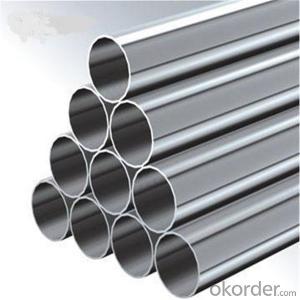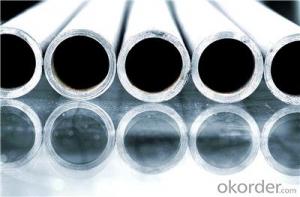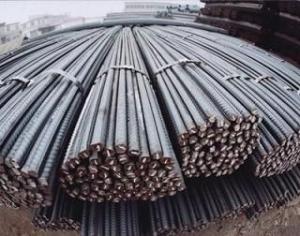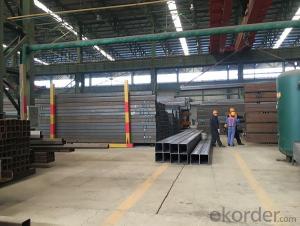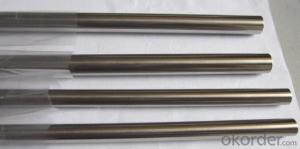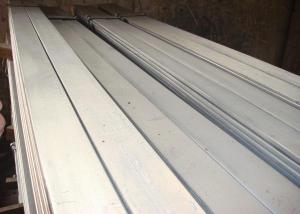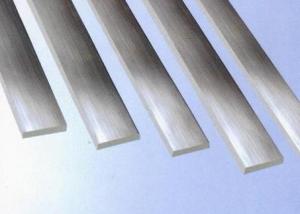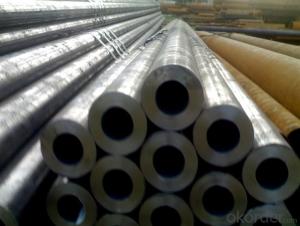Welding of duplex stainless steel pipe with good performance
- Loading Port:
- China main port
- Payment Terms:
- TT OR LC
- Min Order Qty:
- 20 m.t.
- Supply Capability:
- 4000 m.t./month
OKorder Service Pledge
OKorder Financial Service
You Might Also Like
Detail infomation
Standards: ASTM/ASME A789/SA789, A790/SA790,A450,A530
Material: UNS S31803(Cr22Ni5Mo3/1.4462)/2205,UNS S32750(1.4410),UNS S31500(Cr18NiMo3Si2),
UNS32760(1.4501)
Chemical Composition
Grade | C max | Si max | Mn max | P max | S max | Cr | Ni | Mo | N |
UNS S32750 | 0.030 | 0.8 | 1.2 | 0.030 | 0.015 | 24.0-26.0 | 6.0-8.0 | 3.0-5.0 | 0.24-0.32 |
UNS S31803 | 0.030 | 1.0 | 2.0 | 0.020 | 0.020 | 21.0-23.0 | 4.5-6.5 | 2.5-3.5 | 0.08-0.20 |
UNS S31500 | 0.030 | 1.0 | 1.2-2.0 | 0.030 | 0.030 | 18.0-19.0 | 4.5-5.5 | 2.5-3.5 | 0.05-0.10 |
Physical Properties
Grade | Y.S.MPa min | T.S.Mpa min | Elongation % | Hardness HRC |
UNS S32750 | 550 | 800 | 15 | 20 |
UNS S31803 | 450 | 620 | 25 | 20 |
UNS S31500 | 440 | 630 | 30 | 20 |
Supplementary Testing :
we also carry out on the manufactured products supplementary testing.
Radiography Testing |
Macro Testing |
Liquid Penetrate testing |
- Q: Can stainless steel pipes be used for dairy industries?
- Yes, stainless steel pipes can be used for dairy industries. Stainless steel is a highly durable and corrosion-resistant material, making it suitable for the sanitary requirements of the dairy industry. It is widely used in the production, processing, and transportation of milk and other dairy products due to its hygienic properties and ease of cleaning.
- Q: Can stainless steel pipes be used for underground drainage systems?
- Indeed, underground drainage systems can utilize stainless steel pipes. Stainless steel proves to be a robust and corrosion-resistant substance capable of enduring the harsh conditions commonly encountered beneath the surface, encompassing moisture, soil chemicals, and fluctuating temperatures. Furthermore, stainless steel pipes exhibit resistance to rust, a prevalent issue faced by alternative pipe materials. Moreover, their extended lifespan and minimal maintenance demands render stainless steel pipes a fitting selection for underground drainage systems.
- Q: What color is stainless steel? What color is stainless steel pipe culture?
- Stainless steel is usually silver, also has colored stainless steel
- Q: Can stainless steel pipes be stress relieved?
- Yes, stainless steel pipes can be stress relieved. Stress relieving is a heat treatment process that helps to reduce residual stresses in the material, improving its mechanical properties and reducing the risk of cracking or distortion. This process can be applied to stainless steel pipes to enhance their performance and durability.
- Q: What is the difference between 316 and 316LN stainless steel pipes?
- 316 and 316LN stainless steel pipes are variations of the same stainless steel grade known as 316, but there are some distinctions between them. The primary disparity between 316 and 316LN stainless steel pipes resides in their nitrogen levels. 316LN stainless steel contains a higher nitrogen content than 316 stainless steel. The inclusion of nitrogen enhances the material's strength and corrosion resistance, making it more suitable for specific applications. Due to its elevated nitrogen content, 316LN stainless steel pipes display superior resistance to pitting and crevice corrosion, especially in chloride environments. This renders them particularly appropriate for utilization in marine settings or other scenarios where the pipes may encounter corrosive substances. Another contrast between the two grades lies in their availability and cost. 316 stainless steel pipes are more widely accessible and commonly employed, making them generally more cost-effective than 316LN stainless steel pipes. However, 316LN stainless steel pipes may be necessary for particular applications where enhanced corrosion resistance is required. In conclusion, the main difference between 316 and 316LN stainless steel pipes is their nitrogen content, which impacts their corrosion resistance properties. While 316 stainless steel is more readily available and cost-effective, 316LN stainless steel offers improved resistance to pitting and crevice corrosion, making it suitable for specific applications.
- Q: Ask experts, 304 stainless steel pipe why rust?
- Stainless steel corrosion is the dense oxide layer formed on the surface of Cr, to prevent further oxidation of the iron oxide layer, which if destroyed, it is easy to rust, 304 resistance to chlorine ion in chloride solution, low concentration of rust, it will rust quickly in the 304 materials.
- Q: Are stainless steel pipes suitable for oil refinery applications?
- Yes, stainless steel pipes are highly suitable for oil refinery applications. They offer excellent resistance to corrosion, high temperatures, and aggressive chemicals commonly found in refineries. Stainless steel pipes also have high strength and durability, making them ideal for transporting and storing various petroleum products.
- Q: Can stainless steel pipes be embossed?
- Yes, stainless steel pipes can be embossed.
- Q: What is the difference between seamless and longitudinal welded stainless steel pipes?
- The manufacturing processes and structural characteristics of seamless and longitudinal welded stainless steel pipes vary. Seamless pipes, for instance, are formed by heating a solid cylindrical bar of stainless steel and pushing it through a die to create a hollow tube. This process eliminates the need for welded seams, resulting in a uniform composition and consistent strength and corrosion resistance. As a result, seamless pipes are commonly used in high-pressure applications like oil and gas pipelines and refinery equipment due to their superior mechanical properties. In contrast, longitudinal welded pipes are made by joining two separate pieces of stainless steel plate or sheet together through a longitudinal welding process. The plates or sheets are rolled into a cylindrical shape, and the seam is welded along the length of the pipe. This welding technique provides structural integrity and strength to the pipe, although it may introduce some slight inconsistencies in the steel's composition and properties. However, these inconsistencies can be minimized through appropriate welding techniques and quality control measures. Longitudinal welded pipes are widely used in various fields, including structural and architectural projects, as well as in industries such as food processing, pharmaceuticals, and petrochemicals. In conclusion, the main distinction between seamless and longitudinal welded stainless steel pipes lies in their manufacturing methods and resulting structural characteristics. Seamless pipes have no welded seams and offer excellent mechanical properties, making them suitable for high-pressure applications. On the other hand, longitudinal welded pipes are created by welding two separate stainless steel pieces together and are commonly utilized in different industries. The choice between these types of pipes depends on specific requirements and considerations for the intended application.
- Q: What is the difference between seamless and extruded stainless steel pipes?
- Seamless and extruded stainless steel pipes are utilized in various industries and applications, but they differ in several ways. 1. Manufacturing Process: The manufacturing process distinguishes seamless and extruded stainless steel pipes. Seamless pipes are formed through hot rolling or hot extrusion, where a heated cylindrical billet is pushed or pulled through a die to create a pipe without any seams. In contrast, extruded pipes are made using cold extrusion, forcing a solid stainless steel billet through a die to achieve the desired shape and size. 2. Seamless Nature: Seamless pipes, as their name suggests, lack any seams or welds along their length. This attribute enhances their strength and structural integrity. In contrast, extruded pipes may display visible seams or welds, potentially compromising the overall structure. 3. Sizes and Dimensions: Seamless pipes offer a wider range of sizes and dimensions compared to extruded pipes. This is due to the flexibility provided by the hot rolling process, which allows for greater shaping and forming capabilities. Extruded pipes, however, are limited in their size range and are typically used for smaller diameter applications. 4. Surface Finish: Seamless pipes generally boast a smooth and polished surface finish, making them suitable for applications where aesthetics are important, such as architectural structures or decorative elements. Conversely, the manufacturing process of extruded pipes can result in a rougher surface finish, making them more appropriate for industrial or structural applications where appearance is less critical. 5. Cost: In general, seamless pipes are more expensive than extruded pipes due to the complexity of the manufacturing process. The hot rolling method necessitates specialized equipment and a higher level of expertise, increasing production costs. On the other hand, extruded pipes are more cost-effective as they are produced through a simpler cold extrusion process. In conclusion, the differences between seamless and extruded stainless steel pipes encompass their manufacturing process, seamless nature, size range, surface finish, and cost. The choice between the two will depend on the specific requirements of the application at hand.
Send your message to us
Welding of duplex stainless steel pipe with good performance
- Loading Port:
- China main port
- Payment Terms:
- TT OR LC
- Min Order Qty:
- 20 m.t.
- Supply Capability:
- 4000 m.t./month
OKorder Service Pledge
OKorder Financial Service
Similar products
Hot products
Hot Searches
Related keywords
